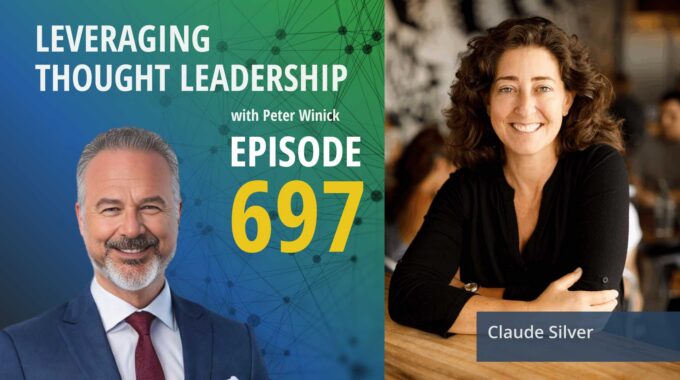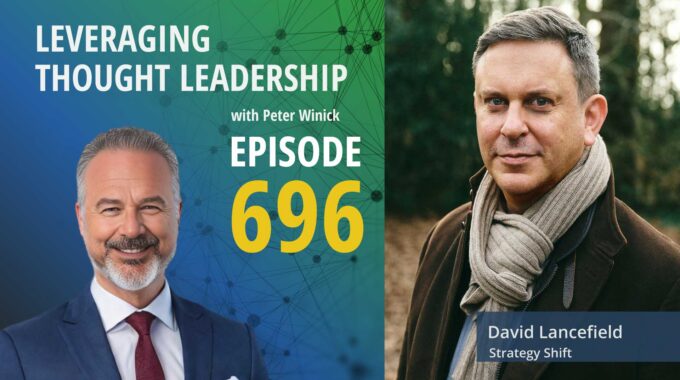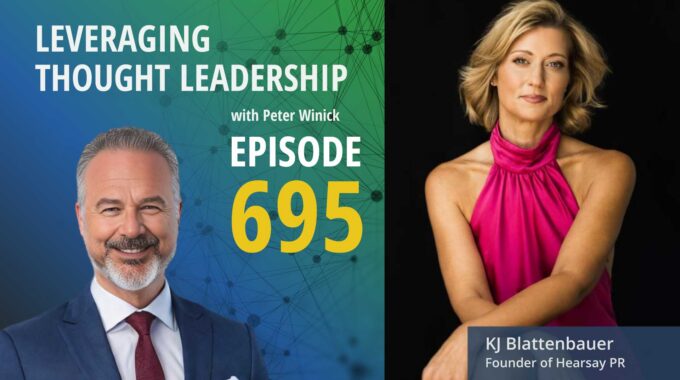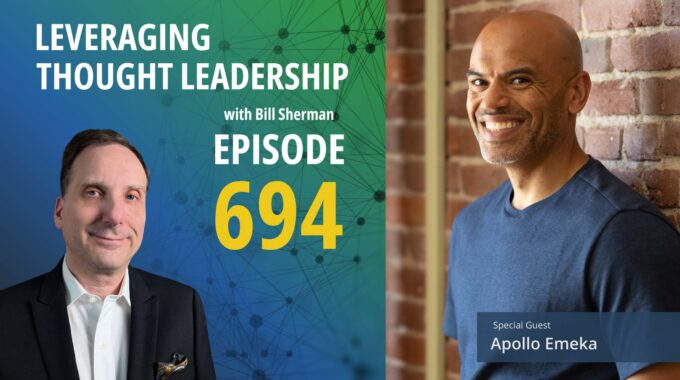Frameworks for connection, accountability, and performance This episode examines how psychological safety drives performance, how…
How to Sharpen Your Thought Leadership | Everett Harper
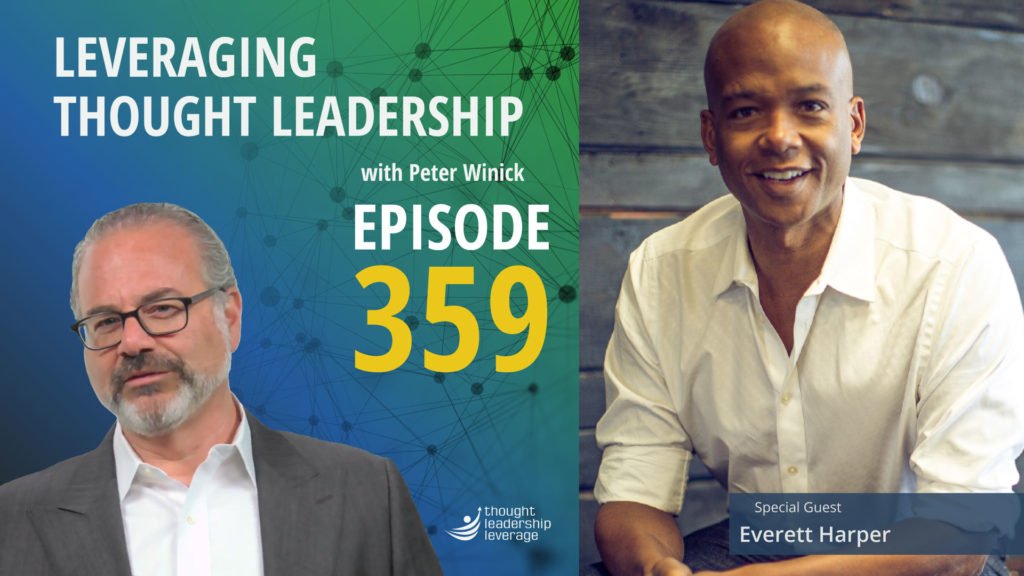
Writing a Thought Leadership book can help you sharpen your ideas.
An interview with Everett Harper about finding answers to complex situations, working shoulder to shoulder with clients, and how writing a book sharpened his insight.
Today’s guest is Everett Harper, the Founder and CEO of Truss. Truss is a software company that works with teams to design, build, and scale software and tech infrastructure to give them the tools they need to excel. Everett is also the author of Move to the Edge, and Declare it Center, a book that helps people lead organizations, solve problems, and sustain company growth with effective practices for complex, uncertain, and unpredictable environments.
Many CEO’s want to write a book about their experiences, but doing so can be an expensive and time-consuming process. How do you know it’s the right time to write a book? What insights and experiences should you share? In Move to the Edge, and Declare it Center, Everett discusses a moment of disquiet in 2020 that compelled him to write – and how that moment has gone on to inspire others through his book.
Everett also describes the process Truss uses with their clients, interviewing not only the leaders of a project but also software operators, end-users, and partners, in order to gain the widest view of complex problems. With that information in hand, they create an infrastructure to help the designers of a software system understand the needs of its end users, and keep both involved throughout the entire entire development cycle.
Three Key Takeaways:
- Nobody knows everything, and not knowing can feel frustrating. Great thought leaders manage that feeling and find a way forward.
- Complex problems don’t always have linear solutions. Thought Leaders can make amazing discoveries by keeping an experimental mindset.
- A good thought leadership book can get you recognized, and bring your insights respect – giving you an edge on the competition.
If you need a strategy to bring your thought leadership to market, Thought Leadership Leverage can assist you! Contact us for more information. In addition, we can help you implement marketing, research, and sales. Let us help you so you can devote yourself to what you do best.
Transcript
Peter Winick And welcome, welcome, this is PW. I’m the founder and CEO of Thought Leadership Leverage. And you’re joining us on the podcast today, which is Leveraging Thought Leadership. Today, my guest is Everett Harper. Everett checks off many of the boxes with regards to types of folks that we love to talk to on the show. He’s the CEO and co-founder of Truss. He’s on the Forbes Council. He is an author of a book called Move to the Edge, which will be coming out shortly by Wiley. He has a Webby Award winner. We can go on and on with is accolades and education, Stanford MBA, etc. As I typically prefer to do, I’d rather just talk to him than about him. So welcome aboard, Everett.
Everett Harper Hey, thanks. And I appreciate it. It’s nice to be here and looking forward to the questions and the conversation.
Peter Winick Yeah, so let’s sort of dive in. I want to dive in from the angle of there’s lots of hats that you wear or lots of ways that one can accurately describe you. But if I think about you as a co-founder and a CEO of a company who’s about to get a book out into the world, the questions that I want think about are how are those two things related? How does the book and what you’re hoping to achieve from it? support the business objectives of you as a CEO and trust and where do they not visit i don’t think it’s a there’s only one way to do that yeah let’s stay there for a moment.
Everett Harper Yeah, so maybe we should talk a little bit about where the book came from. So last year in 2020, as many of us were challenged by pandemic, by protests, by forest fires, et cetera, I was sitting in my backyard between meetings and I was feeling this sense of real discomfort, disquiet in many ways. And it was at the moment when I’ve been sitting in my backyard. surrounded by hummingbirds. I live in Oakland, California, in West Oakland. And hearing the buzz of the hummingbirds, while at the same time, there’s a helicopter circling above me because there were protests downtown in Oakland and in the port where they were shutting things down. So I had this moment of dissonance that seemed to exemplify the issues that many of us were experiencing, trying to figure out how to solve problems while at same time feeling really overwhelmed. And that’s where the book came from. It was really about how do we have that moment where we don’t know what to do, how to move forward, and how do you move forward anyway? What are the steps that we can take to learn and how can we manage that experience of I don’t know, which can make people very, very nervous.
Peter Winick So what if that moment becomes a month, becomes six months, becomes coming on, I don’t know, whatever, we’re almost 18 months from a pandemics phase? Because it feels, I hear what you’re saying. It feels like when there’s a shock to the system or something to overcome, we power through it, we do it. But there’s been so much of it in so many different dimensions, the social fabric, the way we work, how we work. Some of our businesses are taking off, some of them, like, there’s so much at once. And my feeling is, I’d love to get your take is, we don’t have that point of reference to say, oh, so in 2008, when the market crashed, it was sort of like 2001, but a little different. So I have something to compare it to and work off of. I don’t think we have that now, which is kind of odd.
Everett Harper Yeah, I hear that. And I actually wonder if we don’t have some things that can reference, I think it’s the global scale. So there’s a whole body of work around complex problems, complexity. Yes. And they take a look at this, SARS 2001, the real estate crash. And there are people that study this. And it’s been actually really interesting to learn from them about these are really, that’s kind of the problems that we’re going to be facing in the 21st century. What we’re used to is kind of thinking that problems are what they call complicated. They have lots of parts of it, but they’re relatively linear and we apply sort of linear models to it. And we assume that we know the answer. For me, complexity is about, hmm, you don’t necessarily know the answers, but you can discover and make discoveries along the way. So there are.
Peter Winick Is it that acknowledgement up front that because in a linear way the working assumptions and we sort of know what good like looks like on the other side. That’s right. In this case it’s we have to have the confidence that we’ll solve it although we don’t know if it’s behind door number one two three or four what the outcome looks like.
Everett Harper That’s right. It’s really taking more of an experimental mindset and saying, got it. I don’t know the answer, but I can do a set of experiments. I can a set tests. And in many ways, the book is about locating which of those kinds of tests, which of these kinds of experiments can you run and how can you then quickly get answers that enable you to move forward? My own experience as a CEO, sort of tying back to your original question we’ve dealt with as a company very complex problems where we walk in and we don’t know the answer. In fact, we are hired because the answer is not really evident and we have methods in order to help our clients solve them and move forward. And then once we get sort of a sense of an answer, then build systems and infrastructure and practices and methods to take that glimmer of an and turn it into something that’s repeatable. where the outcomes are starting to be known and enable people to follow that system.
Peter Winick So, let me play that back to you sort of in your language a little bit. One of the outcomes of an interaction with the firm is you’ve turned sort of an unknown, complex thing into a manageable, complicated thing.
Everett Harper I would love to say that’s the case. I think we can break it down into different pieces, that’s for sure. But it’s actually keeping open the notion that it’s complex. Let’s take, for example, climate change. No one knows the answer to that. We know what the outcome we want, but what is the way that we go solve that collectively as a global, as a planet? There is not one answer. That’s right. So I might be able to solve a local problem, and have a local outcome, but there are many of these outcomes that need to be knitted together in order to have the ultimate outcome that we’re talking about. So that’s more of the framework that I’m talking about, which does enable you to move and does enable our clients to move forward.
Peter Winick So I want to go back to where we started then. So I love the hummingbird and the helicopter story, because it’s an interesting sort of compare contrast there. You’ve got lots of things that you could be, would be, should be, might be doing with your time as a CEO of a fast growing startup. How do you sort of justify, and I don’t mean this in a bad way, like, you know what? A book is a good idea and here’s why. And some of that could be intrinsic and some of it could be a bit like, give me this sort of holistic. justification or validation of the why.
Everett Harper Sure. And I’ll add, by the way, I’m a parent, I am a human, so as all of us are challenged by this pandemic in many different ways. So the question is, how do I justify or how do we kind of say, is this a good use of my time? Right. There’s, I think, a couple of different reasons, but I’ll focus on this. One is that… We the book is something that I’ve been thinking about since 2016. So the problem is not and the issues are not new I’ve done speeches on it at conferences, etc And so this really takes something that i’ve been think about for a couple years and puts it on paper One of the good things about putting something on paper is it forces you to think
Peter Winick That’s where I was going. So one of the benefits, and we hear this a lot is, and it’s not the headline, but wow, it’s a forcing mechanism to get my thoughts clear and if for no one else, then myself. Right, right. It’s all this stuff bouncing around in your head that you just say, wait a minute, there has to be a beginning, a middle and end. There have to be things that are included and excluded. That’s right.
Everett Harper Yeah, OK, cool. The second is, in terms of why write this book at this time is a good use of time, is it’s an opportunity to play that back to others. So I’ve had manuscripts and versions read by many, many people inside and outside the company, et cetera. And so they helped me sharpen my thinking. So the third is, it was a calling. There is something ineffable about that. So I did it nights and weekends. So it was in addition to what I do as a CEO with a fast growing company, it’s nights and weekend saying, hey, what is this idea that I need to get out of my head and how can I make sure to clarify it? And last and what I hope is that based on my own experience as a company, looking and doing research at others, that it’s useful for others because we have a set of really urgent complex problems we need to solve. And if this is one piece of the dialog that others can then use, that’s a big contribution to the world.
Peter Winick Excellent. So, so let me layer some things on top of that and get your responses. So I, my belief doesn’t mean it’s right or wrong, is one of the beautiful things about thought leadership, and it could live in a book or an article is very, you know, follow you can live in lots of different ways. It allows you to punch above your weight class, right? So you might not be the biggest firm or the most well funded firm or that firm that’s got the biggest and recognize, whatever, in your space. but you can be smarter than or as smart, you can as insightful, you can bring something to the marketplace that’s wow, vis-a-vis the thought leadership in a way that gives you a competitive advantage in a ways that helps you build your brand. And I think it’s the great democratizer where if I can’t outspend, I can out think.
Everett Harper Yeah. Well, in some ways, I mean, my hope is that and, you know, others will be the determinant of that. I can do my best job and they will decide whether I’m adding value. But yes, we are a new company, new-ish. I mean we’re a decade old, but we’re smaller, depending on when this podcast is actually released. When is this podcast actually going to be released? Do you know? Probably before the the end of the year, I would guess So what I can say is we have made the Inc 5000 list for the second year in a row. We are the number 533 of fastest growing companies private in the US. So there’s something that we’re doing that somebody is willing, hopefully has said that we are doing well. But most importantly, a lot of the experiences we have is directly from our work with our clients. We were in the fix for healthcare.gov right after it broke. And there was not an idea of what the answer was. There was an outcome that was very clear. You need to be able to register 7 million people or have a path to 7 million or else Congress gets to shut it down. I think actually at that moment in December, it was 1 million people need to register or they have the ability to shut down ACA. So clear outcome, unclear how you get there. That experience, that’s right, that is right and we and others were able to solve that. We got asked back to build the next section, the next year. We started to realize that, wait a minute, we’re pretty good at this or at least we’re able to learn about how to be good at it. And our business and we trust as a software development company, we do and solve complex software problems on behalf of. government agencies for large Fortune 500 companies, Fortune 100 companies. And those challenges are significant and they’re meaningful and they are under a lot of pressure. And they call us in when they don’t know what to do. And so we can come in and help them. And the thing that I think is important right now is less that we say, okay, you don’t what you’re doing, we do. We have as part of our mantra, working shoulder to shoulder with our clients. People made good decisions at a particular time. We’re helping them figure out how to make better decisions and building with them.
Peter Winick If you’re enjoying this episode of Leveraging Thought Leadership, please make sure to subscribe. If you’d like to help spread the word about our podcast, please leave us a review and share it with your friends. We’re available on Apple Podcast and on all major listening apps, as well as at thoughtleadershipleverage.com forward slash podcast. I wanna push on that for a bit in an interesting way because as a consultant myself, oftentimes, not often, but it’s not uncommon that you get brought into a client situation and you sort of scan the room and go, uh-oh, those two over there. or feeling really bad that you’re even in the room. Oh, absolutely. There’s a perception that that was Everett’s job. And if Everett did his job, then Peter and the team wouldn’t be here. Or we should have, those two should have figured, you know, marketing should have figure this out. Or the CEO should have figures out. So coming in with this value, this principle of. you know, most sort of the big consultants, of course, say, Hey, we’re the smartest persons in the room, right? Sit down, shut up, we’ll tell you what to do and just get out of our way. And ha ha ha, we know you’ve done some things before. And if you could have figured out you would have there’s this this arrogance. And sometimes it’s validated in the the pricing and all that. But just that mindset of saying, Hey listen, We’re smart, you’re smart. We need to do this together and we trust and respect that you probably went about this with good intent with the best that you had. And we, as the advisor, can learn from you before we go in with a blank slate. Because I think there’s a hubris and arrogance sometimes from consultants and advisors coming and going, I am, we kind of don’t care what you did. We’re gonna go in and just apply our methodology to whatever you got. So how do clients, am I right that that’s a big aha? That clients go, that’s different.
Everett Harper Yeah, the approach to work shoulder to shoulder with clients is different in two particular ways. One, I think you articulated really well and no one likes to feel like they aren’t trying to do their best and do the right thing. We start with that as an assumption and that’s gonna get a lot more people working with you than working against you. The second thing is one of the things that we do explicitly is say, we do a lot of discovery. If we’re working with unknowns, or we’re trying to discover new things, we have to do research and interview people. And one of the things that we do that I think is not unique, but distinctive, is we will interview not only the leads and the experts and the senior people, if we’re building software, we’re going to interview the operators of those systems, the people who are managing the systems. because they have, I mean, I’ll give you the story. How many times have you been in a company and it’s announced, we’re gonna implement a new system is gonna make your life better. And you go, I have just figured out the workarounds for the last system that you gave me that was supposed to make my life better that actually didn’t. Had you asked me, I would have been able to tell you one, two, three, four things.
Peter Winick So we ask that’s usually in the belly of the beast. That’s usually three levels down. And that’s right, the folks that are actually on the front lines and such that, that know the answer to the questions, or at least can get you 70, 80% of the way there.
Everett Harper That’s right, and what’s almost 100% consistent, people are delighted to be asked for their expertise.
Peter Winick That is gold, right? But that goes to, it’s interesting because the, it really goes to the whole co-creation model. Right. When it’s an us, you know, when you present me with something that you work on, I could look at it and it’s easy for me to pull out my red pencil and mark it up and whatever. That’s right. If we did it together, you know even if I was only a small contributor, now I’m rooting for it. That’s exactly right. Now I want to win.
Everett Harper Yeah, that’s exactly right. I’ll add one more piece. So we interview the execs, make them feel like they’re smart, they’re part of the solution. We interview people who are quote unquote in the belly of the beast, the operators, make them that they’re a part of this solution, because they are, it’s not make them field, they are part of solution. And then last, we interview customers and we interview clients and we interviewed partners, users of the system, if you will. Those folks are being affected by the decisions and often the feedback loop is broken between the people who’re designing the system and the people are impacted by the system. So we bring all those together. That’s what we mean by shoulder to shoulder. All of those components have the ability to contribute to a solution. And then, and this is the important part, you build an infrastructure around that. So it’s not just one time. You do, and is in a development cycle, every week. You demonstrate what you’ve built. You get the feedback. Hey, we’re on track. Next week, same thing, next week, same thing all the way through to the end of the process so that everybody is part of the solution along the way and it isn’t a big announcement at the end. It’s like, yeah, this looks like it’s.
Peter Winick Psychologically, that’s also a key difference in that, oftentimes someone will be interviewed as part of a diagnostic or a front end or a due diligence for a client. And then crickets, and then some period of time later, six or nine months later, it’s like the auto show, they pull back the curtain and there’s the thing that looks nothing like what you thought about. I love that constant, hey, we did some progress this week, or we had a tough week and we actually had a, the good, the bad and the ugly, but you’re telling me the story and the narrative. That’s exactly right. you’re creating that psychological buy-in. as opposed to people don’t like the surprises. That’s exactly right. Or not feeling heard. Like, wait, you interviewed me and then what the hell did you do with that? Like I told you that X is true and you went Y. Interesting, interesting.
Everett Harper Yeah, let me follow up on that last little piece that the people don’t like surprises. They don’t liked surprises and those surprises, so surprises can be real expensive. Bringing you back to healthcare.gov. It was launched and broke within, I think, seven people. That’s a massive surprise and that’s costly. There’s lots of companies and organizations that build a thing that the customers don’t want. Well, the cost is in dollars. That’s not, sorry. The cost isn’t just dollars, I mean. Oh, absolutely, it’s reputation.
Peter Winick Absolutely. It’s reputation, trust, all that, yeah.
Everett Harper So there’s dollars and there’s time and there is reputation tied in bringing people along with the solution. And that’s the ethos that we have when we say we work shoulder to shoulder with our
Peter Winick We’re going to wrap here, but this is really interesting in terms of understanding what I would call the mindset philosophy principles that are your key differentiators, and I’m not discounting your firm’s ability to actually get paid to do what they do, but the way that you… look at it the way that you approach it is so, so different. I think that’s really, that is thought leadership right there. To be able to hold the spotlight on not we have the smartest coders or here’s our case studies or whatever, but what makes us different is the way we think, the way we act, the we respect, the that. That to me is a form of really valuable thought leadership.
Everett Harper Well, thanks. And I think the key thing is like, if you’re trying to do systemic change, if you really trying to change something in a permanent way, changing how people think and how people view the world is a really powerful lever. Yeah, absolutely. And so that’s a lot of what we’re trying to do. That’s what move to the edge declared center is about. And so, you know, I continue to look forward to seeing if this is something that can be useful for And then we’re all part of this journey. So I expect I’m going to live with the book, what I say with our practice with our company. There’s going to be iterations, and people are going to say, yeah, but that could have been better. And I’m like, great. Let’s learn together.
Peter Winick Exactly, which is a great way to close here. Thank you so much for your time, Everett, and sharing your journey, and best of luck with the upcoming launch.
Everett Harper Thank you very much.



